Past Events
Interested in Cotsen events? Sign up for our mailing list.Abstract: For at least 2,000 years before Spanish arrival in 1502, the province of Bocas del Toro, Panama, sustained numerous vibrant cultures. However, little archaeological research has been done in this area. For decades, this area has been considered a ‘cultural backwater’ with only simple, small-scale settlements. Dr. Tom Wake’s excavations at Sitio Abuelitas and Sitio Drago on Isla Colon, the largest island in Bocas del Toro, have altered this picture as burials, house mounds, and artifacts from across Central America have been found. Carly Pope’s research focuses on the ceramics from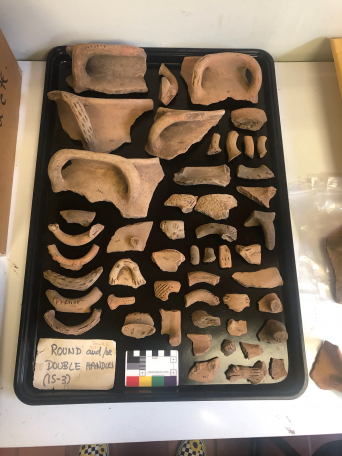 these sites, including locally-made wares as well as foreign imports, and the potential they hold to elucidate both interregional systems of cultural interaction and community-level organization. From July to December 2022, examinations focused on collecting frequency data, selecting samples, and preparing for future research.
these sites, including locally-made wares as well as foreign imports, and the potential they hold to elucidate both interregional systems of cultural interaction and community-level organization. From July to December 2022, examinations focused on collecting frequency data, selecting samples, and preparing for future research.
Bio: Carly Pope was born and raised in Atlanta, GA. She earned her BA in art and archaeology from Princeton University in 2016 and her senior thesis focused on the emergence of early pottery in different parts of Latin America. She continued her education at the University College London, where she obtained a MA in archaeology. For her master’s thesis she analyzed pottery used in salt processing by the Maya of coastal Belize. While her research focuses on Central America, Carly has also excavated at a Roman port in Thrace, Greece; a Basketmaker II site in Cortez, Colorado; a Medieval pilgrims’ cemetery in the Basque area of Spain; a Middle Kingdom amethyst mine near Aswan, Egypt; and a Maya town site in Yucatan, Mexico. She has presented at a variety of academic and professional conferences, including the International Congress on the Anthropology of Salt and the Society for American Archaeology annual meeting.
Contact Sumiji Takahashi
Email sutakahashi@ioa.ucla.edu
Phone 310-825-4169
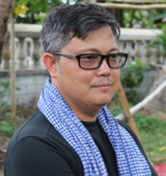
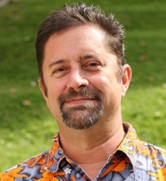
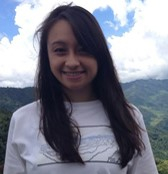
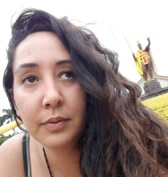
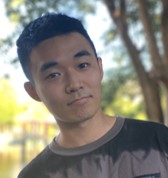
 Abstract: During August of 2022 a collaborative archaeological team led by Stephen Acabado (UCLA) and Kevin DiModica (University of Namur) conducted forensic archaeological investigations at a US WW2 aircraft crash site in eastern Belgium. The purpose of the project was to recover material evidence pertaining to a still missing member of the US aircrew. We discuss the organization of the project, collaboration with our Belgian counterparts and the DPAA, the field methods employed and the results of our field work.
Abstract: During August of 2022 a collaborative archaeological team led by Stephen Acabado (UCLA) and Kevin DiModica (University of Namur) conducted forensic archaeological investigations at a US WW2 aircraft crash site in eastern Belgium. The purpose of the project was to recover material evidence pertaining to a still missing member of the US aircrew. We discuss the organization of the project, collaboration with our Belgian counterparts and the DPAA, the field methods employed and the results of our field work.
Contact Sumiji Takahashi
Email sutakahashi@ioa.ucla.edu
Phone 310-825-4169
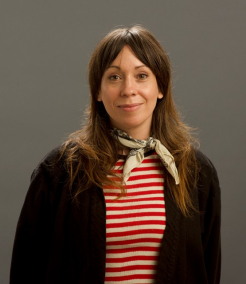 Abstract and Bio: Dr. Sarah A Lacy is a paleoanthropologist and associate professor at California State University Dominguez Hills. Her work on Neanderthals and early modern humans has explored differential oral and respiratory health to understand why we're the only living taxonomic group of humans on the planet today. She is now working with a team in North Macedonia to excavate the site of Uzun Mera, a newly discovered Middle Paleolithic stone tool manufacturing workshop, as well as look for additional sites across the country. This project is also a field school, so that archaeologists in training of all types can participate in a wide variety of excavation and survey methods in a country whose Paleolithic history has only recently begun to be explored.
Abstract and Bio: Dr. Sarah A Lacy is a paleoanthropologist and associate professor at California State University Dominguez Hills. Her work on Neanderthals and early modern humans has explored differential oral and respiratory health to understand why we're the only living taxonomic group of humans on the planet today. She is now working with a team in North Macedonia to excavate the site of Uzun Mera, a newly discovered Middle Paleolithic stone tool manufacturing workshop, as well as look for additional sites across the country. This project is also a field school, so that archaeologists in training of all types can participate in a wide variety of excavation and survey methods in a country whose Paleolithic history has only recently begun to be explored.
Contact Sumiji Takahashi
Email sutakahashi@ioa.ucla.edu
Phone 310-825-4169
![]() Conference 1 Workshop_flyer.pdf
Conference 1 Workshop_flyer.pdf
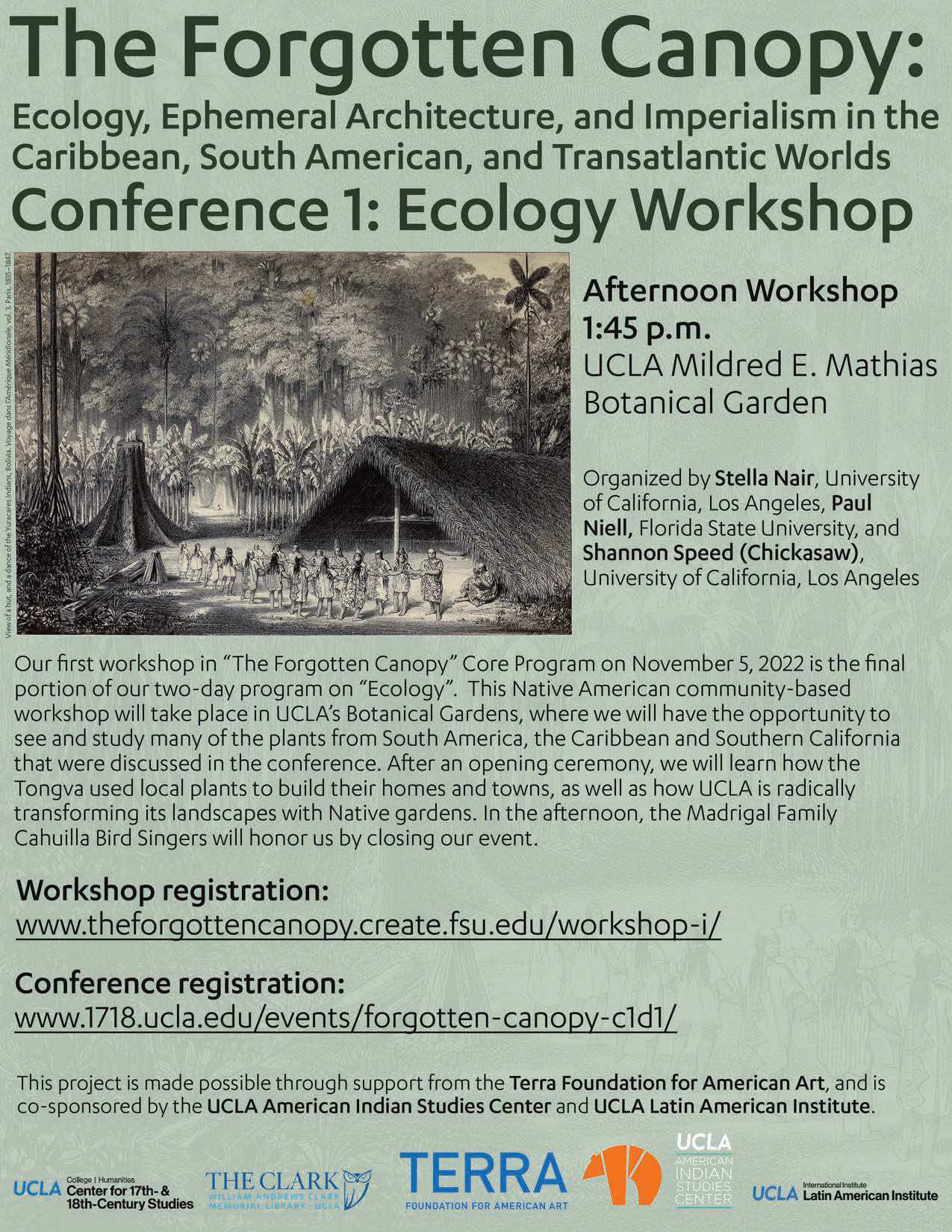
Link to register for Workshop, Saturday November 5 (afternoon) at the UCLA Mildred E. Mathias Botanical Garden: https://theforgottencanopy.create.fsu.edu/workshop-i/
*Registration for in-person attendance closes on Monday, October 31, 2022 at 5:00 p.m. PST. The conference portion of the event will be also livestreamed on the Center’s YouTube Channel. No registration is needed to watch the livestream.
Link to the conference website: https://theforgottencanopy.create.fsu.edu/
Image Credit: View of a hut, and a dance of the Yuracares Indians, Bolivia. Voyage dans l’Amérique Méridionale, vol. 3. Paris, 1835–1847
This project is made possible through support from the Terra Foundation for American Art, and is co-sponsored by the UCLA American Indian Studies Center and UCLA Latin American Institute.
Contact
Phone
![]() Conference 1 Ecology_flyer.pdf
Conference 1 Ecology_flyer.pdf
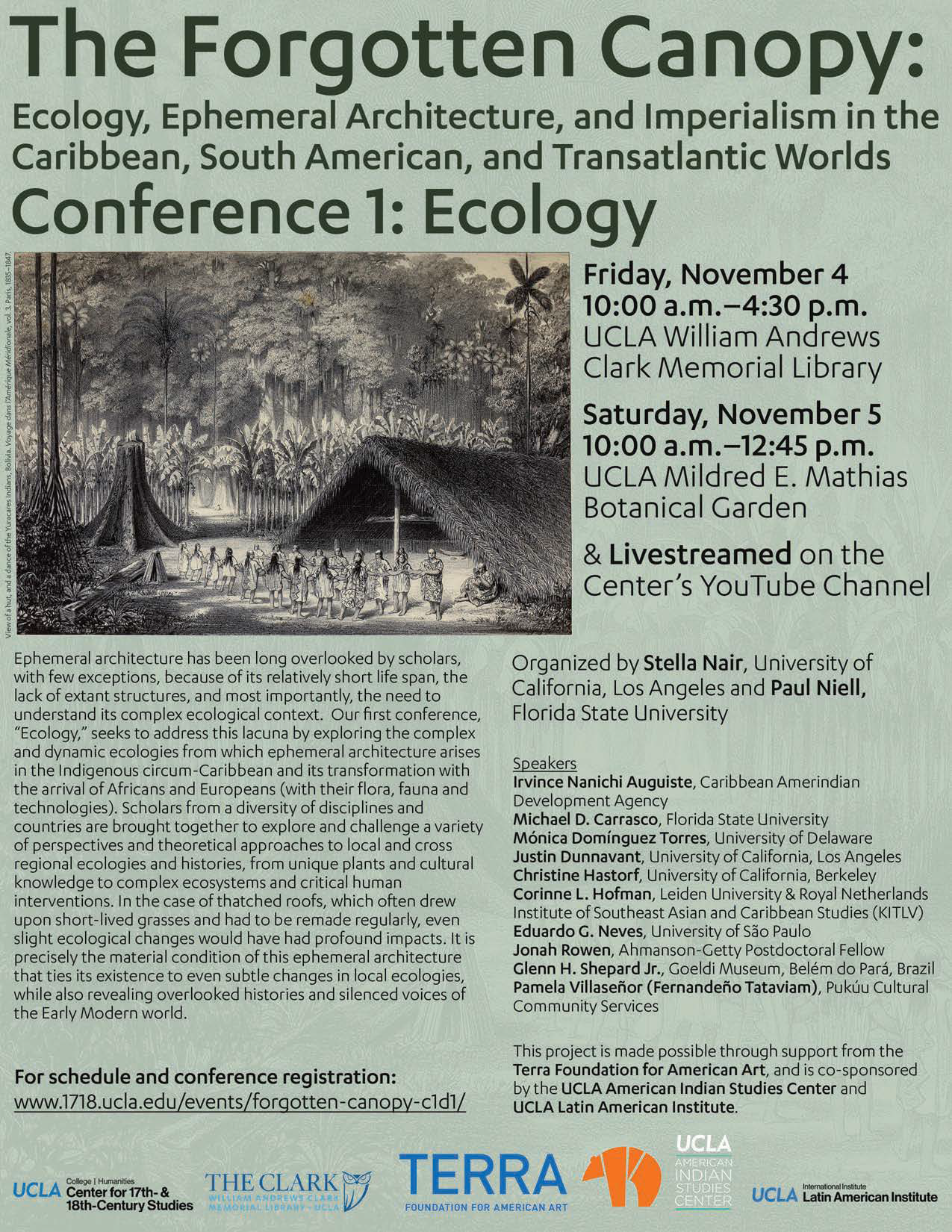
Link to register for Conference Day 2, Saturday November 5 (morning) at the UCLA Mildred E. Mathias Botanical Garden: http://www.1718.ucla.edu/events/forgotten-canopy-c1d2/
*Registration for in-person attendance closes on Monday, October 31, 2022 at 5:00 p.m. PST. The conference portion of the event will be also livestreamed on the Center’s YouTube Channel. No registration is needed to watch the livestream.
Link to the conference website: https://theforgottencanopy.create.fsu.edu/
Image Credit: View of a hut, and a dance of the Yuracares Indians, Bolivia. Voyage dans l’Amérique Méridionale, vol. 3. Paris, 1835–1847
This project is made possible through support from the Terra Foundation for American Art, and is co-sponsored by the UCLA American Indian Studies Center and UCLA Latin American Institute.
Contact
Phone
![]() Conference 1 Ecology_flyer.pdf
Conference 1 Ecology_flyer.pdf
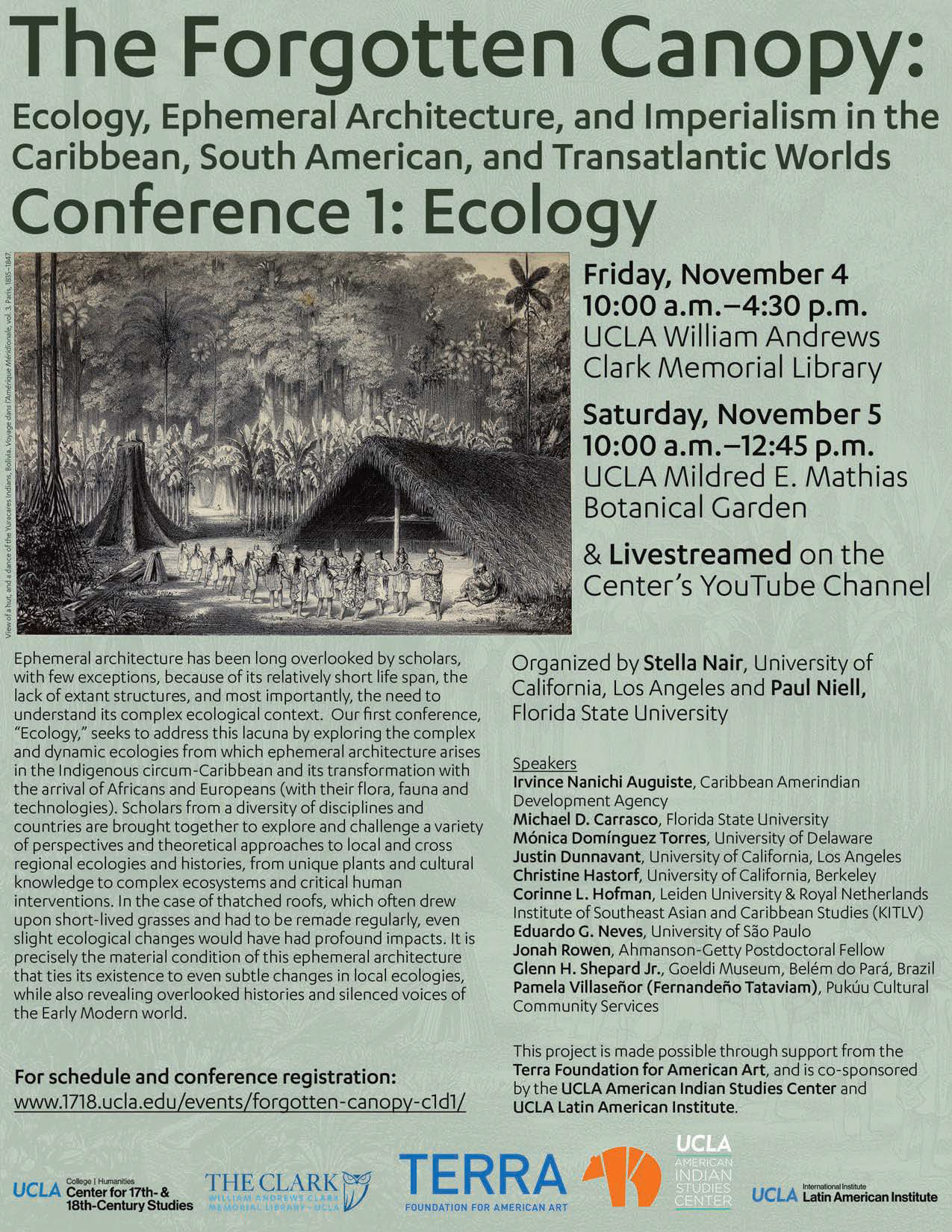
Link to register for Conference Day 1, Friday November 4, at the UCLA William Andrews Clark Memorial Library: http://www.1718.ucla.edu/events/forgotten-canopy-c1d1/
*Registration for in-person attendance closes on Monday, October 31, 2022 at 5:00 p.m. PST. The conference portion of the event will be also livestreamed on the Center’s YouTube Channel. No registration is needed to watch the livestream.
Link to the conference website: https://theforgottencanopy.create.fsu.edu/
Image Credit: View of a hut, and a dance of the Yuracares Indians, Bolivia. Voyage dans l’Amérique Méridionale, vol. 3. Paris, 1835–1847
This project is made possible through support from the Terra Foundation for American Art, and is co-sponsored by the UCLA American Indian Studies Center and UCLA Latin American Institute.
Contact
Phone
Register here: https://ucla.zoom.us/meeting/register/tJEtf-iqrjMiE9GbpWrFQZUs-gaEOVNF2zKG
Few of the world's premodern polities outside of China achieved the scale or density of urbanism
found in the 9th-15th century Angkor empire, which governed a substantial swath of mainland
Southeast Asia. Angkorian rulers built cities, water reservoirs, stone monuments, and roads that
crisscrossed the empire. Carved images glorify their gods, rulers, and ancestors; inscribed stelae
celebrate political accessions and conquests, and narrate religious merits, economic properties,
and status of the populations. Heng will introduce the ancient metropolis of Angkor and its Khmer
world through recent archaeological findings using historical sources, excavation and remotely
sensed ground survey (LIDAR) data. Heng is the 2022-24 postdoctoral scholar at the Cotsen Institute
and the Program for Early Modern Southeast Asia (PEMSEA). His research interests include religious
change, urbanism, political economy, public archaeology, and heritage management. He was a featured
commentator in "Angkor 3D: The Lost Empire of Cambodia," at the California Science Center IMAX
theater.
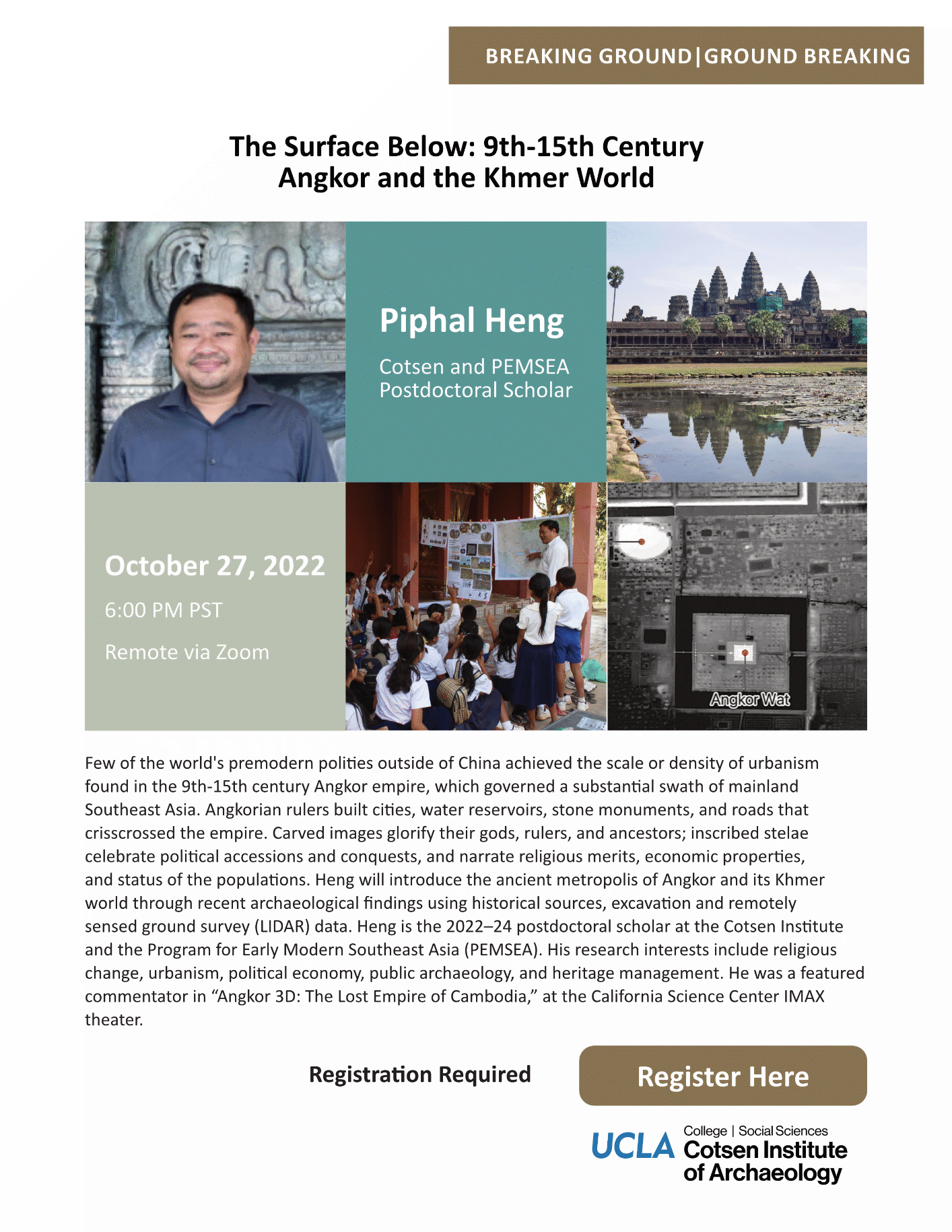
Contact
Phone
Speaker:
Amr Shahat
Postdoctoral Scholar
Cotsen Institute of Archaeology
Abstract: Preservation of organic food remains from Ancient Egypt is an exceptional aspect of the archaeology in this region. The level of preservation of these materials has contributed to the early development of archaeobotany and radiocarbon dating. has contributed his talk will present unpublished food remains from Nag ed Deir, a necropolis situated on the eastern bank of the Nile, and Deir el Ballas, a royal palace complex in Upper Egypt, cross- research that continues this link between the humanities and life sciences. The materials were excavated in the early 1900s by George A. Reisner and Albert Lythgoe and are currently housed at the Hearst Museum of Anthropology at the University of California, Berkeley. I will discuss the results of interdisciplinary analyses applying archaeobotanical and isotopic methods to plant foods from these two sites to understand the anthropogenic impact of climate changes on the foodways and social structures of predynastic Egypt.
A new non-destructive Nano-archaeology method was developed to analyze beer mash to reconstruct early beer composition from Nag ed-Deir, revealing beer recipe specific to the region. I employed a long stable isotope experiment to identify the source region of specific foods to differentiate between local versus imported species, the latter group being represented by the earliest evidence of pomegranate and domesticated watermelon.. These interdisciplinary approaches enable us to reconstruct the social history of none-elite Egyptian foodways as related to regional identities and cross-cultural interactionsThe The methods I will present expand our theoretical perspectives from the humanities side, while serving the field of life sciences through the isotopic data which highlights the anthropogenic impact of climate changes on foodways and social structure.
Bio: Amr Khalaf Shahat, is a postdoctoral researcher at the Cotsen Institute. He earned his PhD in Egyptian Archaeology and Paleoethnobotany from the Cotsen, and his masters in Egyptology from the University of Memphis. He is interested in the study of Egyptian foodways from tombs and settlements to answer questions related to cultural identities and cross-cultural interaction.
Contact Sumiji Takahashi
Email sutakahashi@ioa.ucla.edu
Phone 310-825-4169
Speaker: 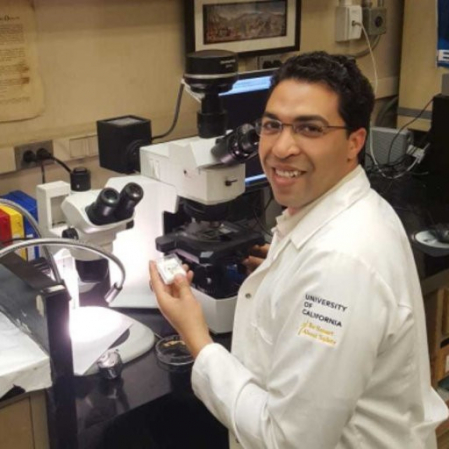
Amr Shahat
Postdoctoral Scholar
Cotsen Institute of Archaeology
Abstract: Preservation of organic food remains from Ancient Egypt is an exceptional aspect of the archaeology in this region. The level of preservation of these materials has contributed to the early development of archaeobotany and radiocarbon dating. In this talk I will present unpublished food remains from Nag ed Deir, a necropolis situated on the eastern bank of the Nile, and Deir el Ballas, a royal palace complex in Upper Egypt, research that continues this link between the humanities and life sciences. The materials were excavated in the early 1900s by George A. Reisner and Albert Lythgoe and are currently housed at the Hearst Museum of Anthropology at the University of California, Berkeley. I will discuss the results of interdisciplinary analyses applying archaeobotanical and isotopic methods to plant foods from these two sites to understand the anthropogenic impact of climate changes on the foodways and social structures of predynastic Egypt.
A new non-destructive nano-archaeology method was developed to analyze beer mash to reconstruct early beer composition from Nag ed-Deir, revealing a beer recipe specific to the region. I employed a long stable isotope experiment to identify the source region of specific foods to differentiate between local versus imported species, the latter group being represented by the earliest evidence of pomegranate and domesticated watermelon. These interdisciplinary approaches enable us to reconstruct the social history of none-elite Egyptian foodways as related to regional identities and cross-cultural interactions. The methods I will present expand our theoretical perspectives from the humanities side, while serving the field of life sciences through the isotopic data which highlights the anthropogenic impact of climate changes on foodways and social structure.
Bio: Amr Khalaf Shahat, is a postdoctoral researcher at the Cotsen Institute. He earned his PhD in Egyptian Archaeology and Paleoethnobotany from the Cotsen, and his masters in Egyptology from the University of Memphis. He is interested in the study of Egyptian foodways from tombs and settlements to answer questions related to cultural identities and cross-cultural interaction.
Contact Sumiji Takahashi
Email sutakahashi@ioa.ucla.edu
Phone 310-825-4169
Speaker: 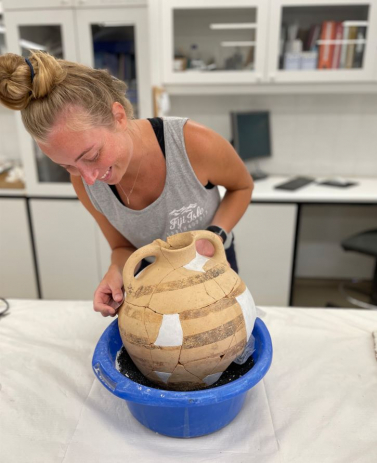
Celine Wachsmuth
M.A. Student
UCLA/Getty Conservation of Archaeological and Ethnographic Materials MA
Abstract: One of the requirements for the MA Conservation degree is a nine month (minimum) internship in one or more conservation labs. By the end of my internship year, I will have worked in three different places; the Institute for Aegean Prehistory Study Center for East Crete (INSTAP), the AfricaMuseum, and the Denver Art Museum (and a very exciting one month at the Denver Museum of Nature and Science). In this talk I will give a brief description of the different things I've been up to since starting my third year. This summer I spent six weeks in Crete working on archaeological ceramic, metal, and glass objects from various sites around East Crete. After a break in August to travel and see family, I started my second internship in Belgium. Here I've shifted gears and been heavily involved in the installation process for a contemporary exhibition and treating a wood object going out on a loan.
Bio: Céline is a third year student in the UCLA/Getty MA program in conservation. She has had the chance to work in many great conservation labs including at the Penn Museum, the Cleveland Museum of Art, a private objects lab in Seattle, a private automaton and horological lab in Seattle, the Anchorage Museum, Fowler Museum, INSTAP, and now the AfricaMuseum.
Contact Sumiji Takahashi
Email sutakahashi@ioa.ucla.edu
Phone 310-825-4169
- ‹ previous
- 11 of 50
- next ›



